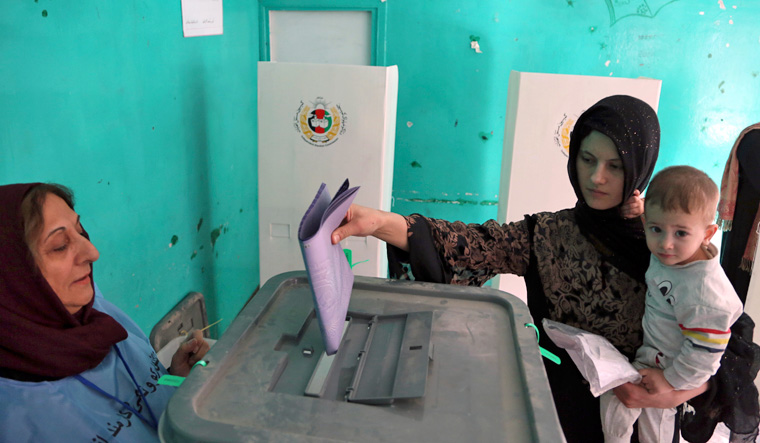Braving bombs, threats of violence, endless queues and delays to keep their date with democracy, Afghans went out to vote on Saturday. Afghanistan President Ashraf Ghani's tweet brandishing his index finger in the air with “I just voted'' said it all. “Today we proved together that we uphold democracy. With casting our ballots without fear we honour the sacrifices of the fallen,'' Ghani tweeted.
The parliamentary elections in Afghanistan took place amid Taliban threats to sabotage the polls. The Taliban had vowed to disrupt the Afghan elections. According to Afghanistan's Independent Election Commission, ten candidates have been killed, two have abducted and four were wounded, in the days leading up to the polls.
On Saturday, multiple explosions rocked polling centres across Kabul. There are also reports that polling will not happen in at least 30 per cent of polling booths. More than 2,500 candidates are contesting for 250 seats in the lower houseof the Parliament.
“The elections are important,'' said Sushant Sareen, senior fellow at the Observer Research Foundation. “It expresses faith in the system.” And by coming out to vote, as well as standing for elections, the Afghans have demonstrated their faith in democracy.
At a function organised by the India Foundation last month, President Ghani said: “The Afghan women will not be put in a cage again.'' He certainly was right. Not bowed down by the threats by the Taliban, there was a record number of women in the fray. A record 417 female candidates are campaigning for a seat. In Kabul, there are 118 women candidates competing for the nine reserved seats in the city. Afghanistan has 27 per cent reservation for women candidates in the Parliament.
This enthusiasm—even in an election that is not a complete referrendrum in Afghanistan—speaks volumes about the commitment of ordinary Afghans towards democracy and peace. The question, however, is whether this election would change things on the ground? With the Taliban refusing to budge—and continuing to fight tooth and nail—the elections are unlikely to do anything to make Afghanistan more peaceful. “Those people who are determined in undoing this, don't care about the elections or the popularity,'' said Sareen.
The security situation isn't the only issue that the Afghans have had to battle. Of the nine million voters who have registered to vote, it is believed, by credible sources, that as many as half of these are fake. The biometrics system that was meant to be foolproof is not tamper free.
The last parliamentary elections were held in 2001. The current elections were to be held in 2016, but have been delayed for the past three years. Despite the delay—and the money poured into the election voter process—Afghanistan still has no fix on how many eligible voters there really are.
Polling has been delayed in certain provinces. In Kandahar, the elections have been deferred for a week following the killing of General Abdul Raziq on Sunday. A powerful local chief, Raziq—who was known for his anti-Taliban stance—was killed when a gunman fired at him at a meeting in the secure governor's compound. General Scott Miller, the top American commander in Afghanistan escaped narrowly as he had just left after attending the meeting. The Taliban claimed responsibility for the incident. In wake of this serious breach of security, the election in Kandahar has been postponed by a week. Kandahar is not the only province to have delayed elections. The elections will not happen in Ghazni or 2,000 polling stations under Taliban rule.



